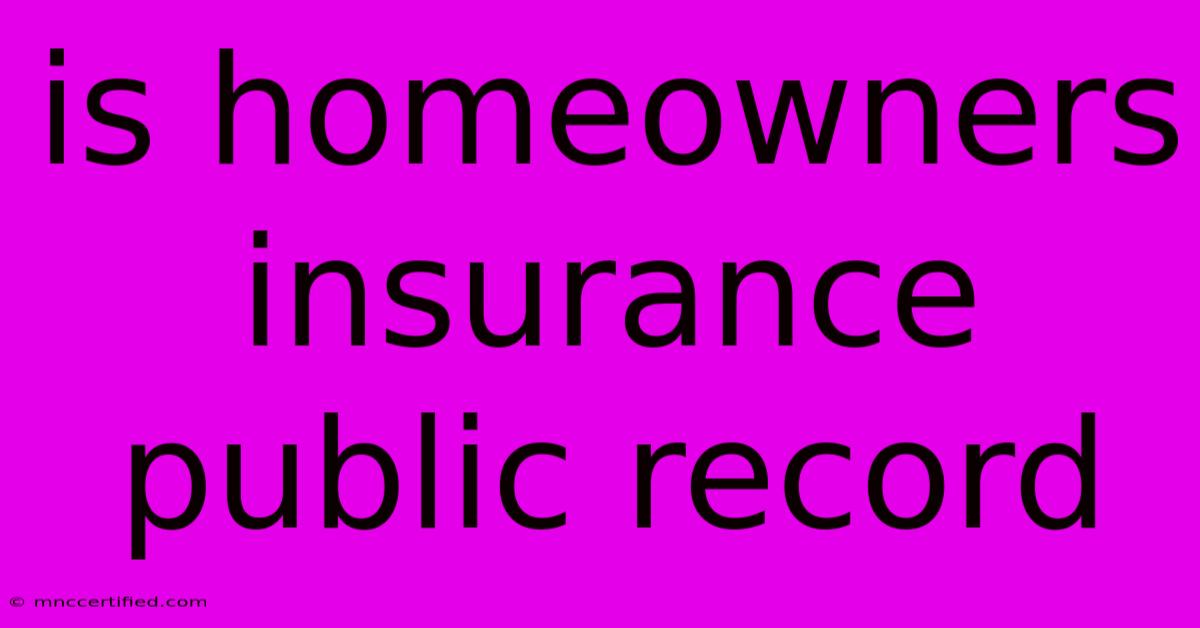Is Homeowners Insurance Public Record

Table of Contents
Is Homeowners Insurance Public Record? Unveiling the Mystery
Whether homeowners insurance information is considered public record varies significantly based on your location and the specific type of information you're seeking. This article breaks down the complexities surrounding homeowners insurance privacy and explores what information might be accessible.
Understanding Public Records Laws
Public records laws are designed to ensure transparency and accountability in government affairs. They typically dictate what information held by government agencies is available to the public. However, the definition of "public record" can be broad and vary from state to state.
What Information Might Be Publicly Available?
While the specifics differ, here are examples of information that could potentially be public record:
- Property Ownership: Basic property ownership details, including the owner's name and address, are often part of public records. This information is typically accessible through property tax records.
- Insurance Claims: In some states, details about insurance claims filed against a property might be considered public record. This could include information about the type of claim, the date of the claim, and the amount paid.
- Property Assessments: Property assessments, which are used to determine property taxes, can sometimes include information about the insured value of a property.
- Government-Issued Permits: Permits for home construction or renovations, issued by local government agencies, might be public record and could contain details about the insured property.
What Information Is Likely Private?
It's crucial to understand that personal details, like policy numbers, coverage amounts, or information about specific risks covered under your policy, are generally not considered public record. This information is protected under privacy laws and is usually only accessible by authorized parties like insurance companies, agents, or with your explicit consent.
Why Does This Matter?
Knowing whether your homeowners insurance information is public record is crucial for:
- Privacy Concerns: Understanding what information might be available publicly allows you to take proactive steps to protect your privacy.
- Fraud Prevention: If your insurance information is public, it could potentially be misused for fraudulent purposes.
- Transparency and Accountability: Public access to some information related to insurance claims can foster transparency and accountability in the insurance industry.
Finding Information: How to Proceed
If you're looking for information about a specific property or homeowner, it's best to consult with your local government offices, including the county recorder's office or the property tax assessor's office. These offices can provide guidance on what records are accessible in your jurisdiction.
Key Takeaways
- There's no one-size-fits-all answer: Public records laws vary significantly by state and locality.
- Your personal insurance details are likely protected: Policy numbers, coverage amounts, and specific risks are generally considered private.
- Property ownership information is often public: Basic details like owner's name and address are commonly accessible through public records.
- Consult local authorities: For specific guidance, contact your local government offices to understand the accessibility of records in your area.
By understanding the nuances of public record laws and how they apply to homeowners insurance, you can better protect your privacy and navigate the complexities of property ownership.

Thank you for visiting our website wich cover about Is Homeowners Insurance Public Record. We hope the information provided has been useful to you. Feel free to contact us if you have any questions or need further assistance. See you next time and dont miss to bookmark.
Featured Posts
-
Australia Defeated Pakistan Wins Series
Nov 10, 2024
-
Insurance Companies In Mooresville Nc
Nov 10, 2024
-
Mushtaq Ali Squad Shaw Among Favorites
Nov 10, 2024
-
Workplace Violence Insurance Coverage
Nov 10, 2024
-
Do Compound Pharmacies Take Insurance
Nov 10, 2024